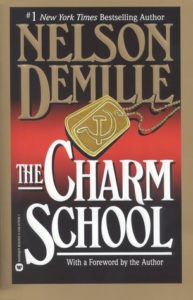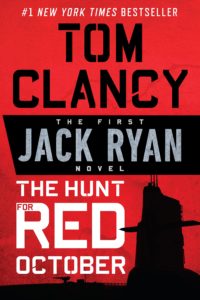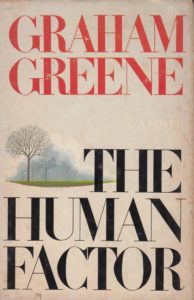With 2019 marking the 30th anniversary of the fall of the Berlin Wall, the iconic symbol of the Cold War, it’s fitting to reflect on books inspired by an era defined by espionage, political intrigue and betrayal. It also begs the question: when did the Cold War officially end? It started, of course, the day that World War II’s fighting stopped, but did it end when the Berlin Wall came down or Christmas Day 1991 when the Soviet Union legally ceased to exist?
If it’s one of those dates, then my new thriller, The Fourth Courier, set in Warsaw in the spring of 1992, technically takes place after the Cold War. Nevertheless, my story has the elements that characterized books inspired by it: spies, dangerous missions, ambiguous morality, assassinations, and even a mad Russian scientist. My inspiration for The Fourth Courier actually stems from an effort by a Russian General to recruit me into a nuclear smuggling operation, and undoubtedly such activities continue to this day, which begs another question. Has the Cold War actually ended? Or is it still being played out with Russia’s meddling in the West’s democratic elections?
With so many spy thrillers set during the Cold War, it would be presumptuous to declare any of them to be the best. Here’s a selection of some notable ones.

The Spy Who Came in from The Cold by John le Carré
No list of Cold War thrillers would be complete without including something by John le Carré who, in fact, could fill the list entirely on his own. Arguably this thin novel is his masterpiece. Set a year after the completion of the Berlin Wall, the spy in the title refers to Alec Leamas, Station Head of British intelligence in West Berlin, who witnesses his last agent assassinated while trying to escape East Berlin. Disillusioned, he returns to “the Circus” in London, where a complex plot is hatched for him to pretend to defect to East Germany, and in turn set up an East German intelligence officer to appear to be a double agent for the Brits. It’s an extraordinarily smart thriller that was immortalized by Richard Burton’s brilliant performance on the big screen.

Istanbul Passage by Joseph Kanon
During World War II, Istanbul was a center of international espionage. In Istanbul Passage, Joseph Kanon sets the story in the immediate aftermath of the war when the espionage community is beginning to pack up. An American businessman, Leon Bauer, has been drawn into their shadowy world by doing odd jobs to support the Allied effort. He’s asked to make one last exchange, which goes fatally awry. An American diplomat cum spy is killed, and Leon ends up hiding a possible war criminal wanted by both the Americans and Russians. Confronted with shifting loyalties and moral uncertainty, it’s the story of a man swept up in the dawn of the Cold War.

The Charm School by Nelson DeMille
On a dark road outside Moscow, an American tourist (Gregory Fischer) stops to help a man, and is astonished to learn that he is an American POW captured in Vietnam some twenty years earlier. He tells Fischer an incredible story about a place known as Mrs. Ivanova’s Charm School, where some 1,000 American POWs are being held captive to teach KBG agents how to pass as Americans in order to infiltrate the country undetected. Fischer reports the extraordinary story to the American embassy, which sets into motion a CIA investigation that reveals the savagery of the Soviet police state. The Charm School is said to be the inspiration for the popular television series, The Americans.

The Hunt for Red October by Tom Clancy
The Soviets’ most advanced nuclear submarine, the Red October, disappears. When it’s determined that its trusted and skillful Commander is defecting, the Soviet fleet is ordered to find and destroy it. That’s no easy task. The missing submarine is equipped with a stealth drive making it impossible to detect with sonar in a million squares miles of ocean in which to hide. The Americans detect Red October’s launch and its sudden disappearance when it activates stealth mode. The fear is that it’s planning a rogue attack on the U.S. A short malfunction of the stealth system gives a quick-witted sonar technician the opening he needs to locate the submarine. An American vessel moves to intercept it. Will the confrontation launch WWIII?

American Spy by Lauren Wilkinson
In the realm of Cold War books dominated by male novelists and white protagonists, Lauren Wilkinson’s American Spy stands out. In the book, which is based on true events, Marie Mitchell, a black FBI intelligence officer, joins a shadowy task force to undermine the charismatic president of Burkina Faso (Thomas Sankara) who has earned the moniker “Africa’s Che Guevara.” Over the course of a year, Marie observes Sankara, seduces him, and eventually has a hand in the coup that brings him down. Her success, however, leaves her doubting what it means to be a spy and a good American.

Berlin Game by Len Deighton
London and Berlin are the favorite settings of Cold War thrillers, and in Berlin Game, Len Deighton creates a web of treachery between both. Brahams Four, the code name for a highly placed British agent in East Berlin, suddenly signals he wants out. Bernard Samson, once an active agent in the field but now a desk officer in London, is assigned the task of extracting him. Soon it becomes clear that there is a mole among Bernard’s colleagues, which makes it even trickier trying to rescue Brahams Four without revealing London’s whole network of spies in Berlin. In murder mysteries, the question is “Whodunit?” In spy novels, it’s “Whoisit?”. In this carefully crafted novel, the search for whoisit ends in the biggest betrayal of all.

An Honorable Man by Paul Vidich
Paul Vidich’s 2016 debut novel, An Honorable Man, is set in 1950s Washington DC, where the Cold War is heating up amidst the demagoguery of McCarthyism. Josef Stalin’s death has left a dangerous power vacuum in the Soviet Union. Inside the CIA, a presumed double agent, codenamed Protocol, is blamed for helping Moscow assassinate the CIA’s local assets and ruthlessly stop other operations. The CIA, only seven years old, knows McCarthy will destroy its public standing if word gets out about the Russian mole. The CIA hires George Mueller to ferret him out. Who could be more qualified? Yale-educated, he’s run missions in Eastern Europe, and is so dedicated he’s chosen job over wife. Mueller, though, has secrets of his own, and when it’s learned that he’s made contact with a Soviet agent, suspicion falls on him. Until Protocol is found, everyone is a suspect.

The Deceivers by Alex Berenson
Has the Cold War truly ended? Alex Berenson doesn’t think so. In The Deceivers, it’s clear that it’s only moved from surrogate battlefields to ballot boxes and other new extremes. When the Islamic State claims responsibility for a massive terrorist attack in Dallas, certain aspects of the event suggest a larger plot. CIA operative John Wells investigates and uncovers sleeper cells, false flag operations, and double agents high in the U.S. government—all orchestrated by Moscow to stir up nationalist feelings among Americans to elect a right-wing politician to the White House. A Cold War fear akin to The Manchurian Candidate that no longer seems incredulous.

The Human Factor by Graham Greene
It’s hard for a good Cold War thriller not to be a morality play. Almost each one raises questions about loyalty, conscience of heart, and the blurring of right and wrong to pursue questionable objectives. That’s certainly true of Graham Greene’s The Human Factor. Maurice Castle, an aging bureaucrat in the British secret service, lives a quiet life looking forward to retirement, when an intelligence leak in the Africa section where he’s assigned makes him suspect. So is Davis, a younger colleague who’s accused of being a double agent on circumstantial evidence and is soon dispatched by a bowl of moldy nuts. Maurice is, in fact, a double agent, and has been since a former colleague and Communist helped smuggle his wife out of South Africa. Ever since, he’s helped Moscow out of gratitude. Davis’s death makes him question the mortality of the institution where he works. The book puts the human factor at the heart of the Cold War, building suspense through doubt and paranoia, and examining how bigger international politics affects individuals.

















